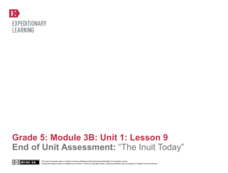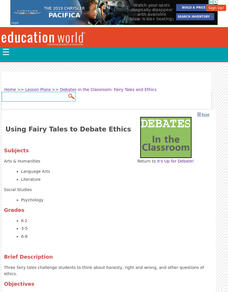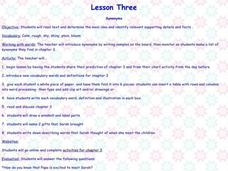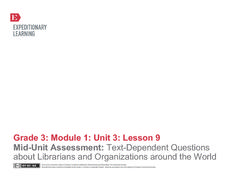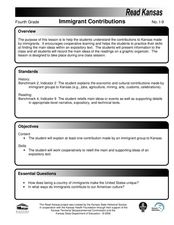EngageNY
Determining Main Ideas and Details to Write a Summary Paragraph: “Food”
Let's eat! Scholars read pages 24-25 of The Inuit Thought of It to discover the foods eaten by the Inuit. They sketch a visual gist of the section in their journals and write a summary paragraph about the text.
EngageNY
End of Unit Assessment: “The Inuit Today”
Then and now. Scholars complete an end of unit assessment covering The Inuit Thought of It by comparing past and modern day life for the Inuit. They complete a main idea graphic organizer, analyze key terms, and write a summary paragraph.
Curated OER
Come Fly with Me . . . Open a Book: Travels through Literature
This detailed overview of a curriculum unit suggests using travel literature to engage and stimulate your third graders’ interest in reading. The suggested reading list includes fiction and non-fiction materials and offers urban children...
Curated OER
Using Fairy Tales to Debate Ethics
Is trickery ever justified? Is it okay to steal from someone who has stolen from you? Puss, from Puss in Boots, and Jack, from Jack and the Beanstalk, might have some ideas about these ethical questions. After listening to a series of...
EngageNY
Comparing and Contrasting Two Texts about Poison Dart Frogs: Eggs and Tadpoles
Poison Dart Frog babies are the focus of a instructional activity that challenges scholars to compare and contrast two informational texts. Beginning with a read-aloud, followed by a discussion, readers complete a practice page that...
Curated OER
Face to Face Summary!
Students, while in the computer lab visiting the National Geographic Kids website, fill out a checklist of unimportant/redundant information, look for important events and ideas and search for the author's main idea and supporting...
CC Homestead
Summarize
Designed for third graders but appropriate for older learners as well, this packet of materials underscores the necessity of teaching kids how to summarize, how to identify main ideas and supporting details, and how to ask questions...
Curated OER
Synonyms
Students examine synonyms from their reading. In this synonyms lesson, students use vocabulary from their reading to create a chart and illustrate the words. Students complete online activities from the story.
EngageNY
Mid-Unit Assessment: Answering Text-Dependent Questions About Librarians and Organizations Around the World
This is a skills-based assessment that asks test takers to use textual evidence to determine the main idea of an excerpt from an informational text as well as respond to text-dependent questions. The assessment is the middle point...
EngageNY
Close Reading of Excerpts from My Librarian Is a Camel: How Do People Access Books Around the World?
Acquaint your class with informational text through a close reading. First, examine a couple of pages together, looking at text features and content. The whole class focuses on marking down a brief summary of each paragraph before...
EngageNY
Close Reading of Thank You, Mr. Falker: Identifying the Superpowers of Reading
Third graders read excepts from the story, Thank You, Mr. Falker in order to gain practice in understanding an unfamiliar story by focusing on the details. They use a worksheet, embedded in the plan, which directs them to certain...
EngageNY
Close Reading of That Book Woman: How Did People Access Books in Rural Areas of the United States?
For this ninth lesson plan in a larger beginning-of-the-year unit, close reading skills are used independently to find the gist of the story That Book Woman. Rereading for important details is the targeted skill to unlock a deeper...
Curated OER
Narrative Writing
Are you the oldest in your family? The youngest? The middlest? How do you feel about your place in your family? After reading such stories as My Rotten, Redheaded Older Brother by Patricia Polacco and Tales of a Fourth Grade Nothing by...
Curated OER
Scrapbook of Evidence
Students read three different genres of fiction. They create a story map and brainstorm possible collage inclusions. Each student prepares a minimum of two scrapbook page entries for each text or passage. Students write beside each...
EngageNY
Close Reading: The Introduction to the Universal Declaration of Human Rights
As part of a group of lessons, your class will return to the primary text for this unit, the Universal Declaration of Human Rights. Key vocabulary as well as close reading strategies continue to be the focus skills; however, this lesson...
Scholastic
Lesson 3: Essay Organizer
A three-minute exercise warms-up scholars' writing abilities in order to follow a writing process that ends in an essay. The essay's topic is a barrier and the values used to break it. Four steps include choosing a topic, jotting-down a...
Curated OER
Go Free or Die
Groups of older elementary learners begin their study of figurative language by visiting a website and completing the exercises detailed there. They then apply what they have learned by finding examples in several poems. Finally, they...
EngageNY
Revisiting Big Metaphors and Themes: Revising and Beginning to Perform Two-Voice Poems
Now that your class has read all of Esperanza Rising, take the time to tackle big metaphors and themes. Pupils will participate in an activity called Chalk Talk, in which they circulate around the room in small groups and add comments to...
Curated OER
Environmental Benefits of Recycling
Fourth graders understand the benefits of recycling. In this recycling literacy activity, 4th graders read an article and identify the main idea. Students understand the process of transfer to the landfill and discuss how recycling helps...
Curated OER
Immigrant Contributions
Students read a passage about immigrants making contributions to the state of Kansas and write the main ideas and details of what they read. For this immigrant contributions lesson plan, students fill out a graphic organizer of immigrant...
EngageNY
Building Background Knowledge: Jigsaw to Build and Share Expertise about the 2010 Haiti Earthquake, Part 2
Calling all experts! Using the educational resource, pupils work together in small expert groups, reading an article about the 2010 Haiti earthquake. As they read, they record two main ideas and supporting details from the text.
Scholastic
Holes Match 'Em Up Challenge
Upper graders read the book Holes as a class or by themselves. In groups, they identify symbols and discuss how they are connected among the many plots in the story. They create a timeline in which they sequence the main events to end...
Curated OER
Researching the Past
Learners research the western movement in order to learn note taking strategies with nonfiction texts. They use the Internet to search for important information about the western movement using the Cornell Notes note-taking system. They...
EngageNY
Taking Notes Using a Graphic Organizer: Inferring About Work and Play in Colonial America
What was life like in colonial America? Follow this lesson and your pupils will find out what people in colonial times did for work and for fun. Ask learners to compare and contrast the two texts and explain what the reading helped them...
Other popular searches
- Details and Main Ideas
- Finding Main Idea Details
- Identify Main Idea and Details
- Topic Main Ideas Details
- Details Supporting Main Idea
- Main Idea Details Passage
- Details Main Idea
- Main Idea Details Test
- Topic Main Idea Details
- Topic Main Idea and Details
- Main Idea Details Newpaper
- Main Idea Details New Paper



